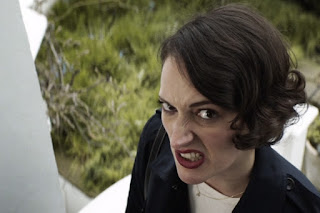Let's get the good bit out the way first – Fleabag is brilliant. It's a brilliant, funny, truthful, poignant, modern, bold, frank sitcom that follows the eponymous heroine (creator Phoebe Waller-Bridge) as she crashes through her life, reverses over the bodies and sideswipes passersby, veering from random sexual partners to ex-boyfriend to failing cafe to acid-evil stepmother and disloyal father to neurotic sister and lascivious husband to flashbacks of her dead best friend and back again in a kaleidoscopic whirl of grief, casual sex and alienation. It lightly skips the abyss between cutting truthfulness and absurdist satire as and when it chooses. And it talks about the corrosive effects of grief with a beautiful clarity. It's fucking brilliant and if you haven't seen it, you shouldn't definitely watch it before I give away any more about it.
Go on, go and watch it
Last chance. Don't say I didn't warn you.
Go on, go and watch it
Last chance. Don't say I didn't warn you.
It's brilliant, but I've got a lot to say ... So, there's a big twist in the last episode – as you know, because you've watched it. It turns out that it was Fleabag's betrayal of her best (and possibly only) friend Boo that brought about Boo's suicide/accidental death. But, as much as I loved the show, the twist left me cold.
It is a good twist; it reveals something unexpected about her character, something that her unreliable narration and supposed confiding in the audience had not. And it's not that I haven't, in retrospect, come to accept it. I mean, I can see that it would be, just about, possible that, despite all the flashbacks of her and Boo being BFFs, Fleabag could have done the great boyfriend-shagging betrayal. I mean, she could have – she might have been jealous, and worried about losing her BFF to him, perhaps, but it's a lot they didn't show. And perhaps the night Fleabag spends wondering the streets in guilt and grief is because she knows we the viewers – who she has confided in all along – have found out; I mean, obviously, she must have already known the truth, so being reminded by her sister wouldn't have pushed her to that existential climax, would it? And I guess that her sister could have only brought it back up in anger after Fleabag's revelation about her husband almost pushed her to divorce – I suppose, but it seems weird after the show built up so much love between the two of them. But what I'm saying is: I can do the mental gymnastics to make the twist plausible, but it's hard work, it doesn't trip off the mind, and I think that they sacrificed a lot to get the twist in, and I think it was probably a mistake.
For the TV writer, big twists are basically the equivalent of a line of high-grade cocaine – they give a great, unexpected, exciting jolt, but can be deleterious for your character. The balance between plot and character in fiction is so fraught that a huge plot twist can take the character right off the page with it, and this, I think, is what happened here.
But perhaps it's to do with me. Perhaps I'm resistant to the twist because I really liked Fleabag's character and didn't want to deal with her horrible betrayal, or perhaps I'm jealous of the accomplishment of the sitcom and want to take it down a peg, or perhaps because I've struggled with the same problem of twists – and considered more or less than same twist, revealing an unreliable, unlikable and guilty narrator, I wasn't as surprised as I could have been – I don't know. I definitely had the experience of creating a character as isolated as Fleabag, and faced the problem of why, if they're likeable enough to be a main character, they are so isolated. And the two main reasons I came up with are both in Fleabag: grief and guilt, although the show does a great job of adding the further level of hideous supporting characters, which I didn't manage.
I'm not sure they telegraphed the twist enough to make it work – putting in enough pointers to her true character early enough – but they may have done, and I may have just missed them. In the end, I think it's more that I was loving the way they built such a touching portrayal of grief in the guise of comedy, and I was disappointed they threw that away at the last for the sake of a big shock.
There's so much great about the last episode; when Hugh Dennis leaves the cafe after her outburst, without giving her the loan she needs – but then, when you're gasping for it, he comes back, to give the bit of good news that you, and Fleabag, desperately needs. And the story is, in the end, about redemption and forgiveness – we all make mistakes, it says. Quite a Christian topic, and I watched it on Christmas Day, so it was like my very own Archbishop's speech. But, if that was the case, it might have been more honest to have brought the guilt in earlier, rather than save it for the big reveal. And that's the trouble with a big twist: it's a bit grubby, a bit of a manipulation, and when something was as truthful and brilliant as this show, it deserved better.
